Charles E W Bean, Diaries, AWM38 3DRL 606/250/1 - 1917 - 1937 - Part 6
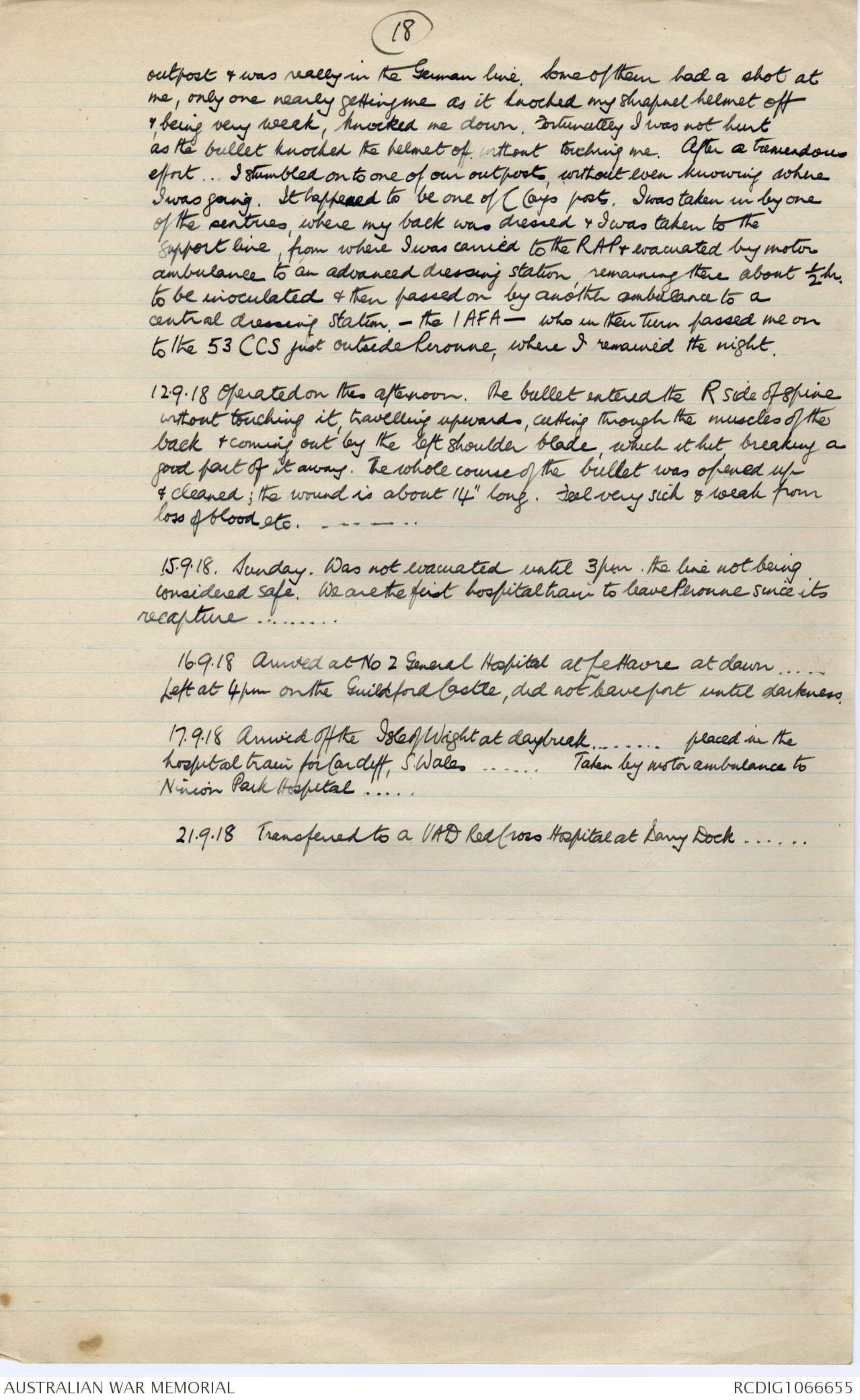
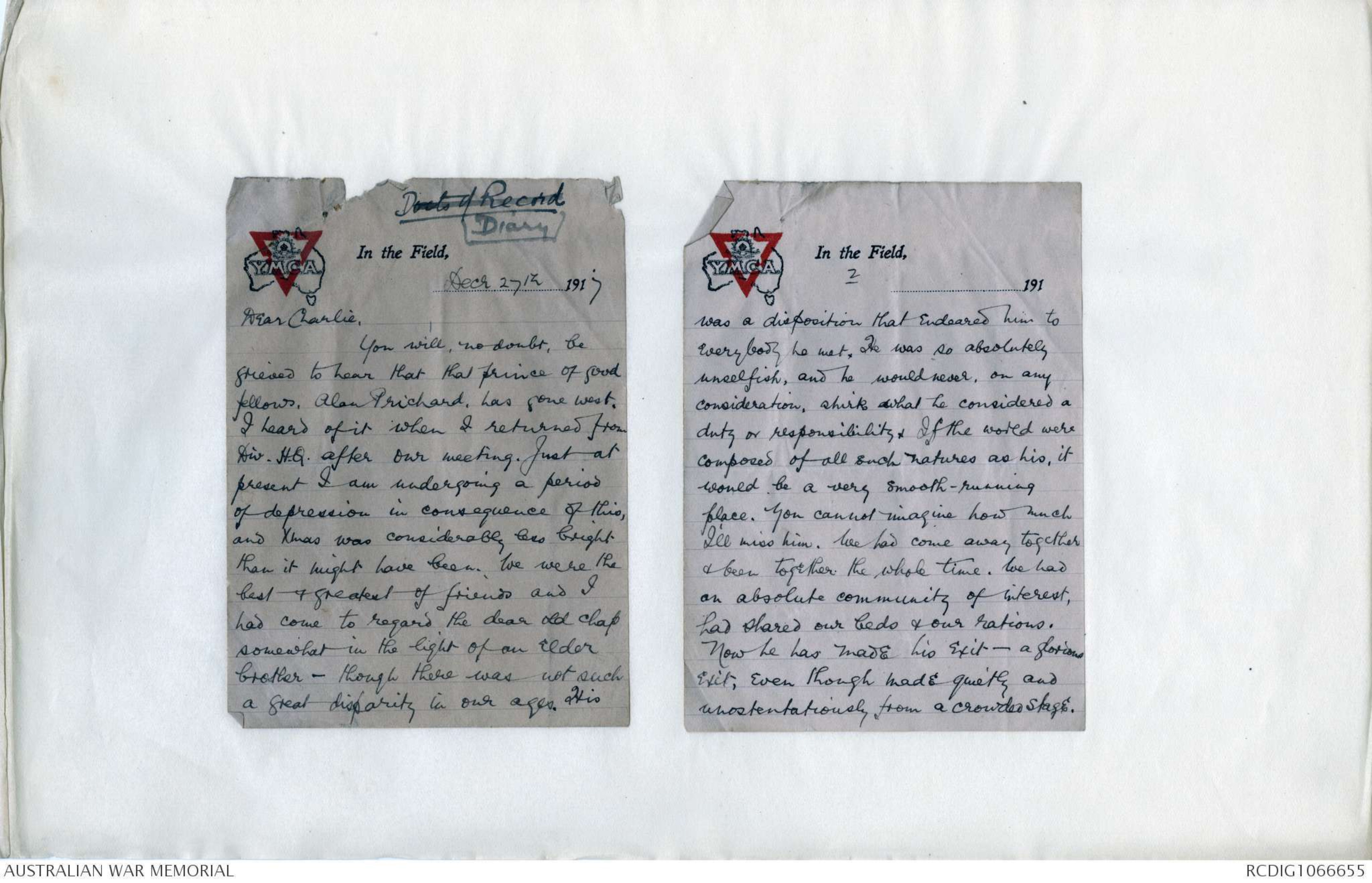
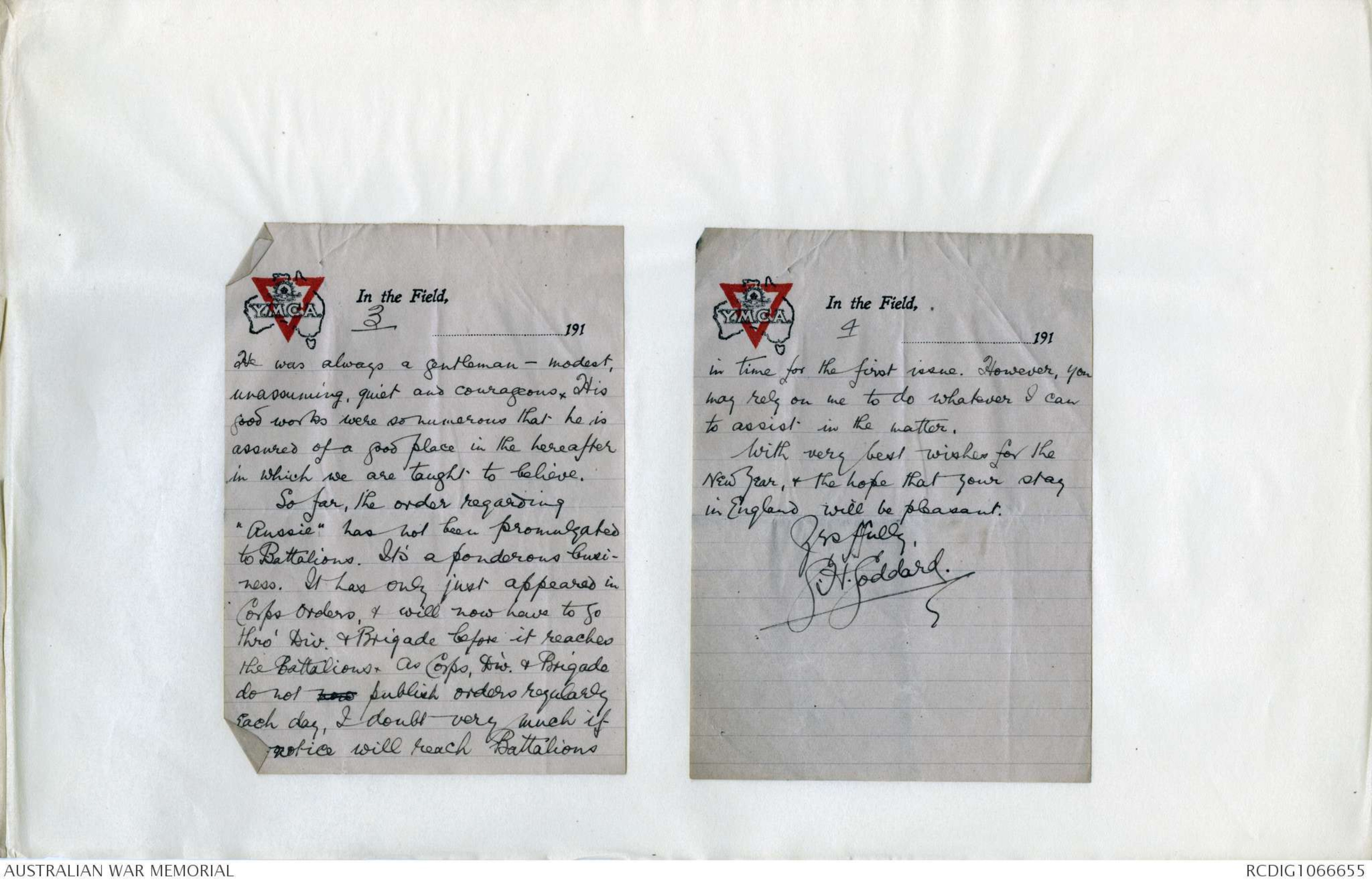
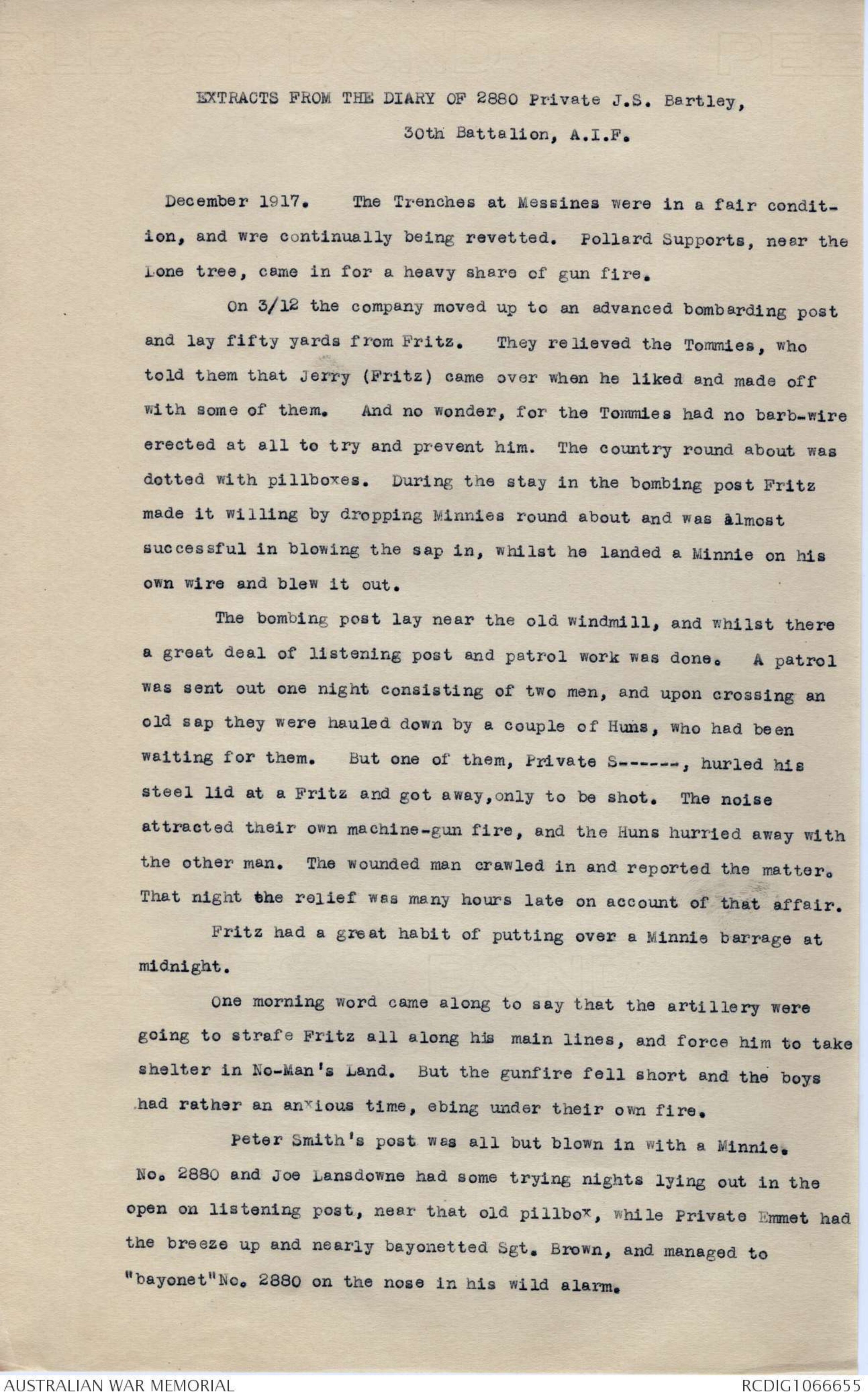
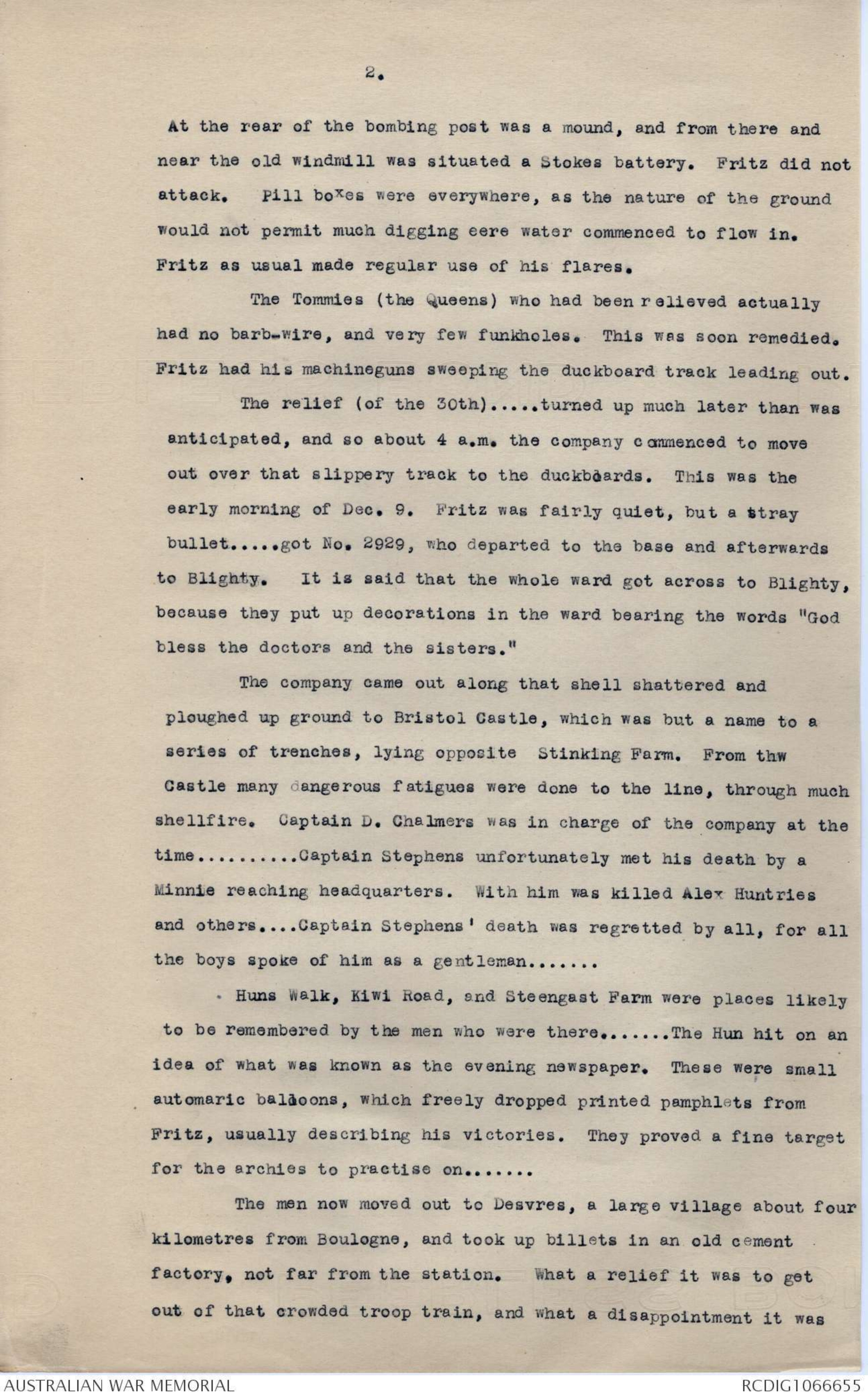
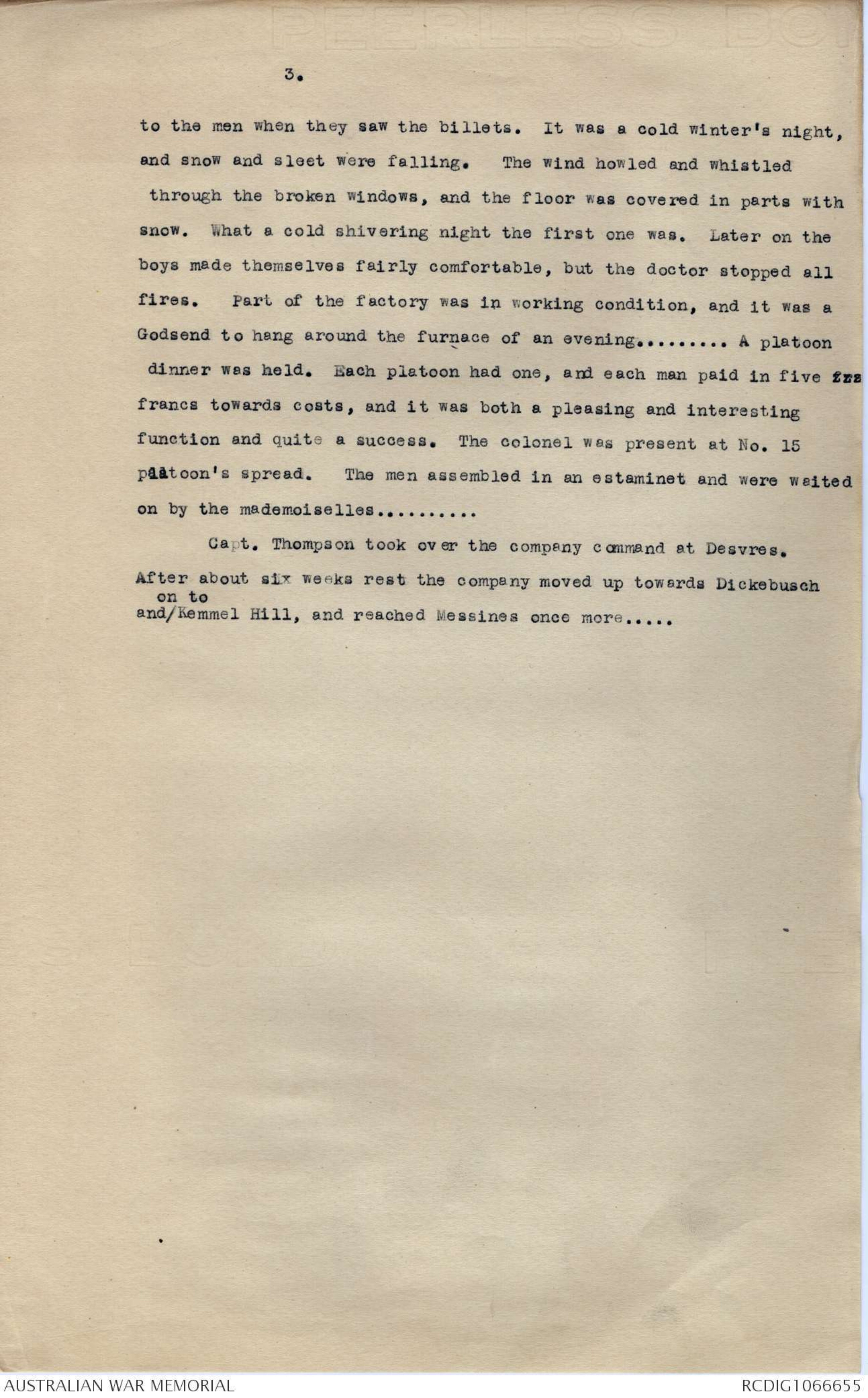
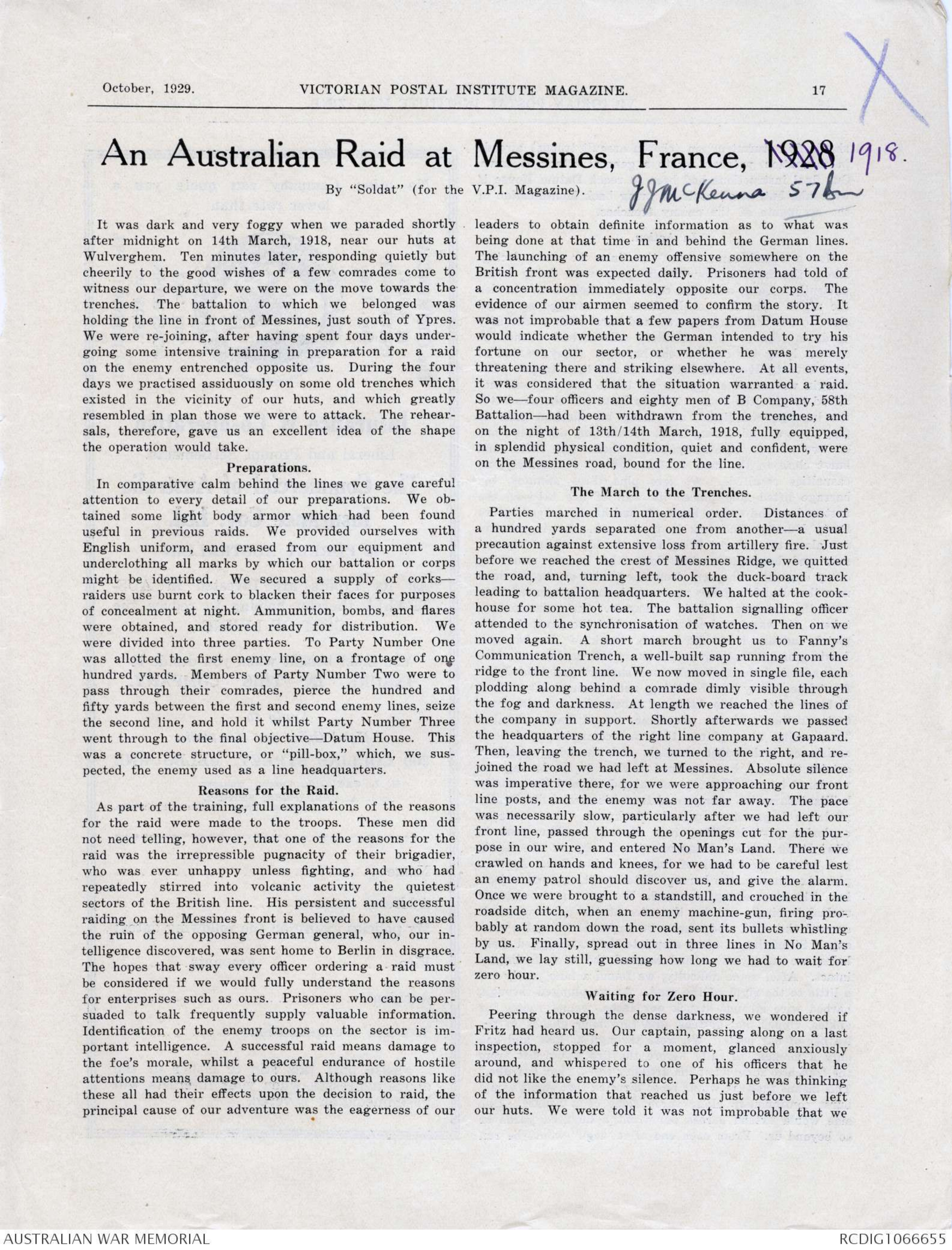
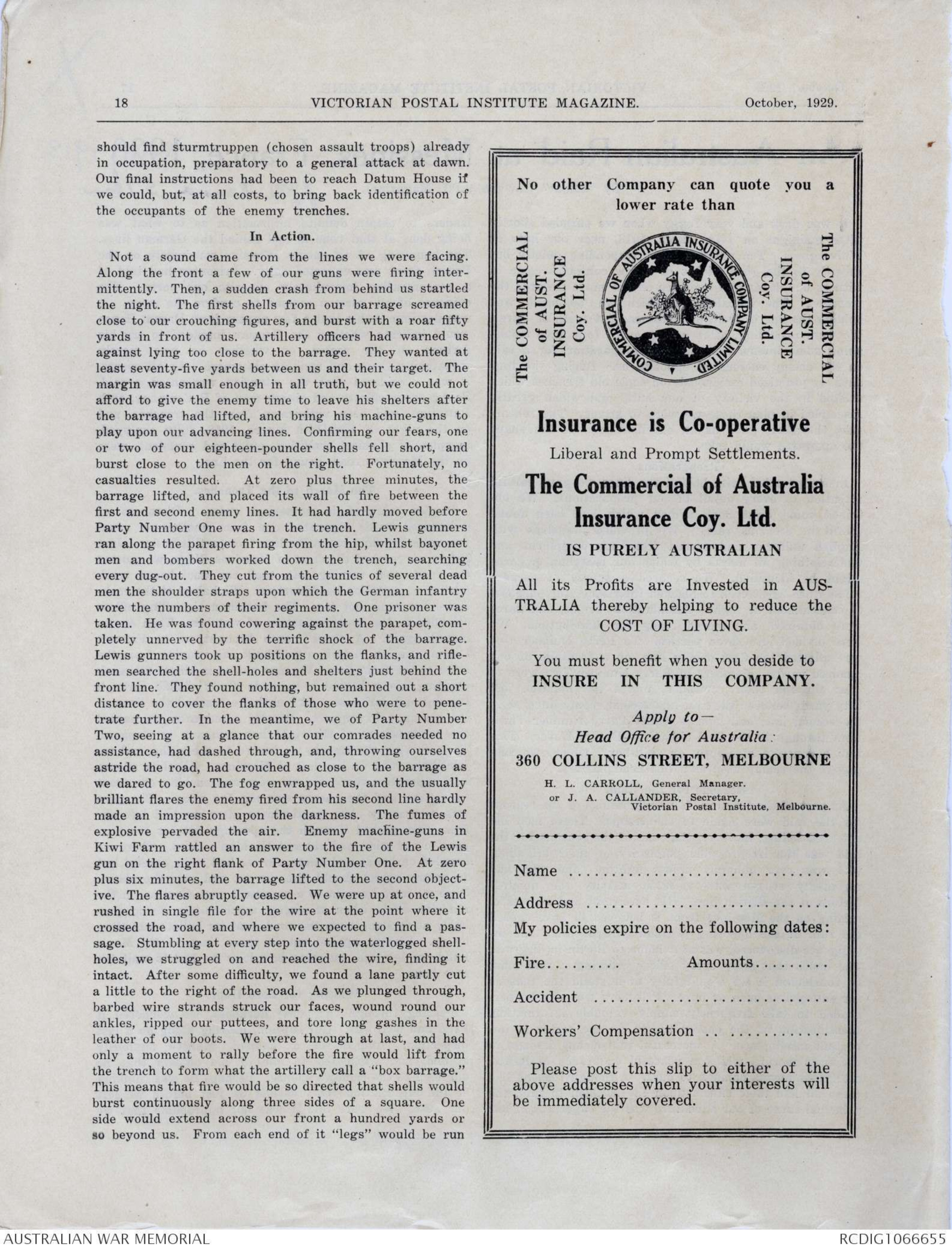
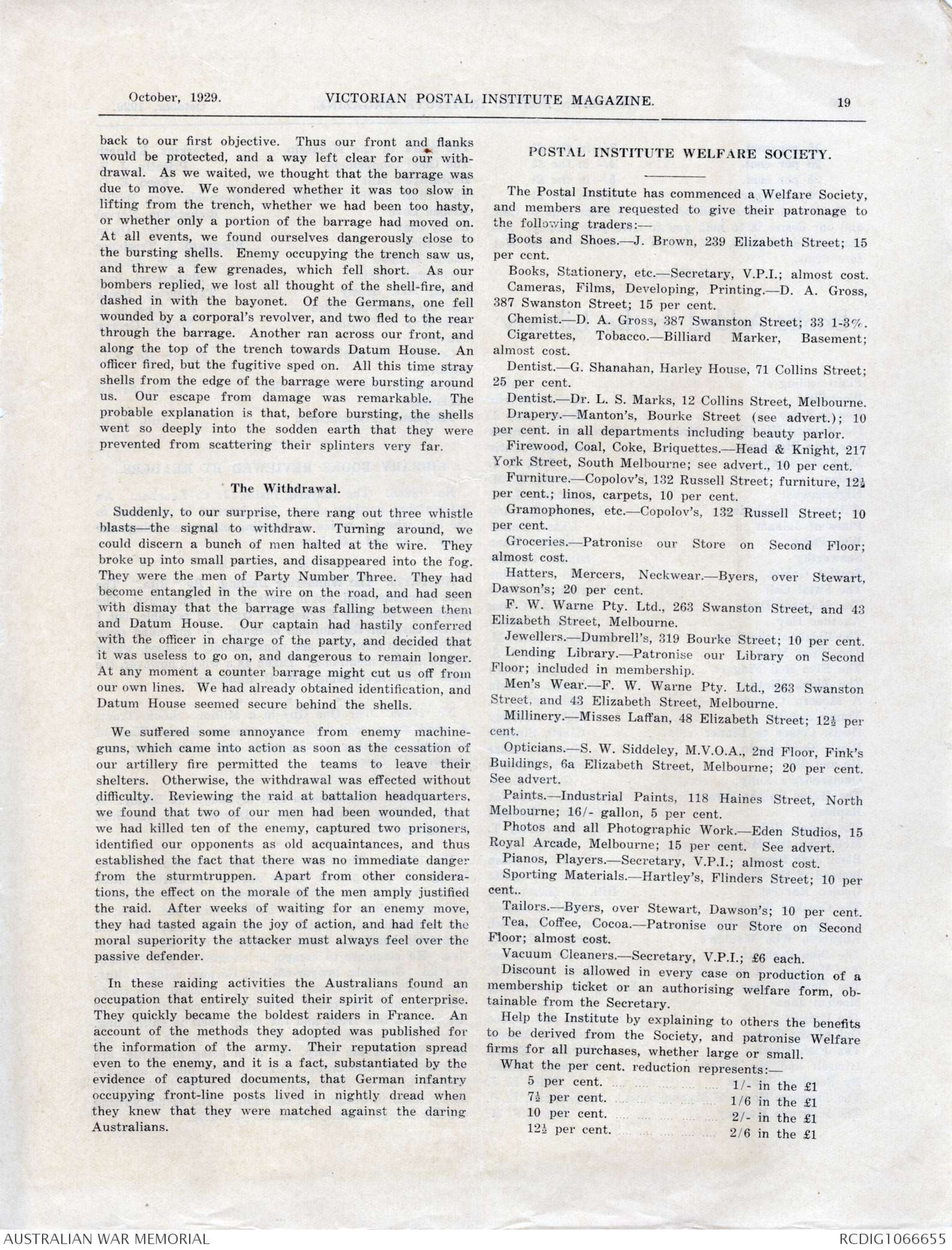
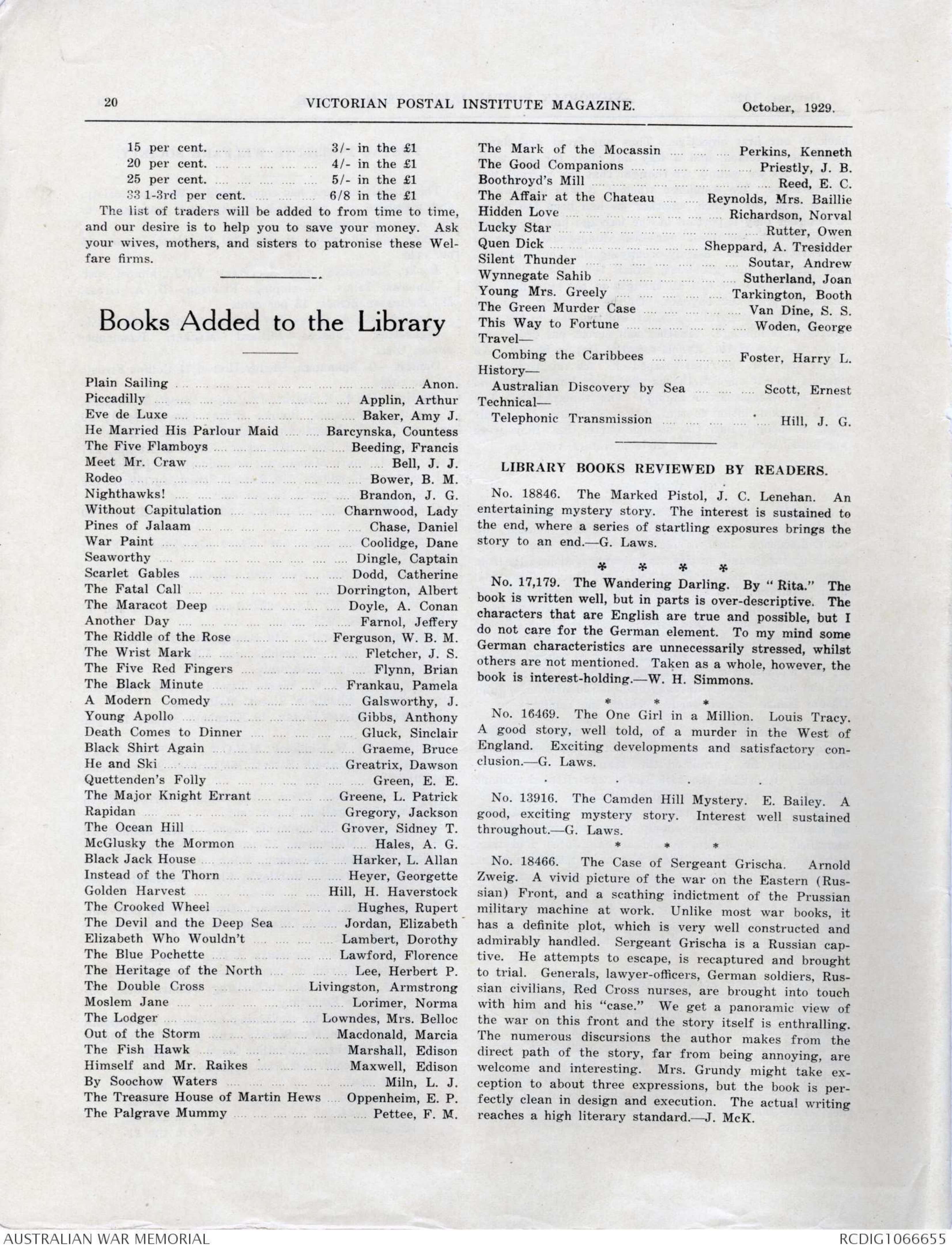
18
outpost & was really in the German line. Some of them had a shot at
me, only one nearly getting me as it knocked my shrapnel helmet off
&, being very weak, knocked me down. Fortunately I was not hurt
as the bullet knocked the helmet off, without touching me. After a tremendous
effort... I stumbled on to one of our outposts, without even knowing where
I was going. It happened to be one of C Coys posts. I was taken in by one
of the sentries, where my back was dressed & I was taken to the
support line, from where I was carried to the RAP & evacuated by motor
ambulance to an advanced dressing station, remaining there about ½hr.
to be inoculated & then passed on by another ambulance to a
central dressing station. – the 1 AFA – who in their turn passed me on
to the 53 CCS just outside Peronne, where I remained the night.
12.9.18 Operated on this afternoon. The bullet entered the R side of spine
without touching it travelling upwards, cutting through the muscles of the
back & coming out by the left shoulder blade, which it hit breaking a
good part of it away. The whole course of the bullet was opened up
& cleaned; the wound is about 14" long. Feel very sick and weak from
loss of blood etc. . . . . .
15.9.18. Sunday. Was not evacuated until 3 p.m. the line not being
considered safe. We are the first hospital train to leave Peronne since its
recapture......
16.9.18 Arrived at No 2 General Hospital at Le Havre at dawn.....
Left at 4 p.m. on the Guildford Castle, did not leave port until darkness.
17.9.18 Arrived at the Isle of Wight at daybreak...... placed in the
hospital train for Cardiff, S. Wales......Taken by motor ambulance to
Ninion Park Hospital...
21.9.18 Transferred to a VAD Red Cross Hospital at Barry Dock...
Dircts of Record
Diary
Y.M.C.A. In the Field,
Decr 27th 1917
Dear Charlie,
You will, no doubt , be
grieved to hear that that prince of good
fellows, Alan Prichard, has gone west.
I heard of it when I returned from
Div. H.Q. after our meeting. Just at
present I am undergoing a period
of depression in consequence of this,
and Xmas was considerably less bright
than it might have been. We were the
best and greatest of friends and I
had come to regard the dear old chap
somewhat in the light of an elder
brother - though there was not such
a great disparity in our ages. His
Y.M.C.A. In the Field,
2
191
was a disposition that endeared him to
everybody he met. He was so absolutely
unselfish, and he would never, on any
consideration, shirk what he considered a
duty or responsibility. If the world were
composed of all such natures as his, it
would be a very smooth-running
place. You cannot imagine how much
I'll miss him. We had come away together
& been together the whole time. We had
an absolute community of interest,
had shared our beds & our rations.
Now he has made his exit - a glorious
exit, even though made quietly and
unostentatiously from a crowded stage.
Y.M.C.A. In the Field,
3 191
He was always a gentleman - modest,
unassuming, quiet and courageous. His
good works were so numerous that he is
assured of a good place in the hereafter
in which we are taught to believe.
So far, the order regarding
"Aussie" has not been promulgated
to Battalions. It's a ponderous business.
It has only just appeared in
Corps Orders, & will now have to go
thro' Div. & Brigade before it reaches
the Battalions. As Corps, Div. & Brigade
do not now publish orders regularly
each day, I doubt very much if
notice will reach Battalions
Y.M.C.A. In the Field,
4 191
in time for the first issue. However, you
may rely on me to do whatever I can
to assist in the matter.
With very best wishes for the
New Year, & the hope that your stay
in England will be pleasant.
Yrs ffully
G.H. Goddard.
EXTRACTS FROM THE DIARY OF 2880 Private J.S. Bartley,
30th Battalion, A.I.F.
December 1917. The Trenches at Messines were in a fair condition,
and wre continuously being revetted. Pollard Supports, near the
Lone tree, came in for a heavy share of gun fire.
On 3/12 the company moved up to an advanced bombarding post
and lay fifty yards from Fritz. They relieved the Tommies, who
told them that Jerry (Fritz) came over when he liked and made off
with some of them. And no wonder, for the Tommies had no barb-wire
erected at all to try and prevent him. The country round about was
dotted with pillboxes. During the stay in the bombing post Fritz
made it willing by dropping Minnies round about and was almost
successful in blowing the sap in, whilst he landed a Minnie on his
own wire and blew it out.
The bombing post lay near the old windmill, and whilst there
a great deal of listening post and patrol work was done. A patrol
was sent out one night consisting of two men, and upon crossing an
old sap they were hauled down by a couple of Huns, who had been
waiting for them. But one of them, Private S------, hurled his
steel lid at a Fritz and got away, only to be shot. The noise
attracted their own machine-gun fire, and the Huns hurried away with
the other man. The wounded man crawled in and reported the matter.
That night the relief was many hours late on account of that affair.
Fritz had a great habit of putting over a Minnie barrage at
midnight.
One morning word came along to say that the artillery were
going to strafe Fritz all along his main lines, and force him to take
shelter in No-Man's Land. But the gunfire fell short and the boys
had rather an anxious time, ebing under their own fire.
Peter Smith's post was all but blown in with a Minnie.
No. 2880 and Joe Lansdowne had some trying nights lying out in the
open on listening post, near that old pillbox, while Private Emmet had
the breeze up and nearly bayonetted Sgt. Brown, and managed to
"bayonet" No. 2880 on the nose in his wild alarm.
2.
At the rear of the bombing post was a mound, and from there and
near the old windmill was situated a Stokes battery. Fritz did not
attack. Pill boxes were everywhere, as the nature of the ground
would not permit much digging eere water commenced to flow in.
Fritz as usual made regular use of his flares.
The Tommies (the Queens) who had been relieved actually
had no barb-wire, and very few funkholes. This was soon remedied.
Fritz had his machineguns sweeping the duckboard track leading out.
The relief (of the 30th).......turned up much later than was
anticipated, and so about 4 a.m. the company commenced to move
out over that slippery track to the duckboards. This was the
early morning of Dec. 9. Fritz was fairly quiet, but a stray
bullet....got No. 2929, who departed to the base and afterwards
to Blighty. It is said that the whole ward got across to Blighty,
because they put up decorations in the ward bearing the words "God
bless the doctors and the sisters."
The company came out along that shell shattered and
ploughed up ground to Bristol Castle, which was but a name to a
series of trenches, lying opposite Stinking Farm. From thw
Castle many dangerous fatigues were done to the line, through much
shellfire. Captain D. Chalmers was in charge of the company at the
time.........Captain Stephens unfortunately met his death by a
Minnie reaching headquarters. With him was killed Alex Huntries
and others........Captain Stephens' death was regretted by all, for all
the boys spoke of him as a gentleman.......
Huns Walk, Kiwi Road, and Steengast Farm were places likely
to be remembered by the men who were there.......The Hun hit on an
idea of what was known as the evening newspaper. These were small
automaric balloons, which freely dropped printed pamphlets from
Fritz, usually describing his victories. They proved a fine target
for the archies to practise on......
The men now moved out to Desvres, a large village about four
kilometres from Boulogne, and took up billets is an old cement
factory, not far from the station. What a relief it was to get
out of that crowded troop train, and what a disappointment it was
3.
to the men when they saw the billets. It was a cold winter's night,
and snow and sleet were falling. The wind howled and whistled
through the broken windows, and the floor was covered in part with
snow. What a cold shivering night the first one was. Later on the
boys made themselves fairly comfortable, but the doctor stopped all
fires. Part of the factory was in working condition, and it was a
Godsend to hang around the furnace of an evening........ A platoon
dinner was held. Each platoon had one, and each man paid five frs
francs toward costs, and it was both a pleasing and interesting
function and quite a success. The colonel was present at No. 15
platoon's spread. The men assembled in an estaminet and were waited
on by the mademoiselles.........
Capt. Thompson took over the company command at Desvres.
After about six weeks rest the company moved up towards Dickebusch
and on to Kemmel Hill, and reached Messines once more......
PAGE FROM MAGAZINE: See Original Document
October, 1929. VICTORIAN POSTAL INSTITUTE MAGAZINE. 17
An Australian Raid at Messines, France, 1928 1918.
By "Soldat" ( for the V. P.I. Magazine). JJ McKenna 57 Bn
PAGE FROM MAGAZINE: See Original Document
18 VICTORIAN POSTAL INSTITUTE MAGAZINE. October, 1929.
PAGE FROM MAGAZINE: See Original Document
October, 1929. VICTORIAN POSTAL INSTITUTE MAGAZINE. 19
PAGE FROM MAGAZINE: See Original Document
20 VICTORIAN POSTAL INSTITUTE MAGAZINE. October, 1929.
 H.Boutell
H.BoutellThis transcription item is now locked to you for editing. To release the lock either Save your changes or Cancel.
This lock will be automatically released after 60 minutes of inactivity.